Author: Lexie
Source: Silicon Rabbit Race
In recent years, we have witnessed various fancy tricks in the social arena. It seems that every few days, a new social app emerges, quickly attracting users with new gameplay. They appear everywhere, proclaiming to be the next “king of social”, but most of them are gradually abandoned as people’s novelty wears off.
Among the rise and fall is Clubhouse, an audio social app that was once hard to come by. But if we think about it carefully, we haven’t seen any news about it in a long time.
- Hundreds of project-oriented foundations ‘in need of money’. Will Arbitrum’s new incentive program work?
- NFT Ticketing Overview of Adoption by Traditional and New Force Companies in the Entertainment Industry
- LianGuai Daily | Coinbase to offer perpetual futures to non-US retail investors; US government notifies employees government may shut down soon
Clubhouse Highlights: The Favorite Chatroom of the Big Shots
Clubhouse was launched in April 2020, initially only available on iOS. It focuses on socializing through audio. At first, users could only use Clubhouse by invitation, and in just 8 months, the number of users exceeded 600,000. Even Andreessen Horowitz invested $10 million in Clubhouse within a month of its launch.
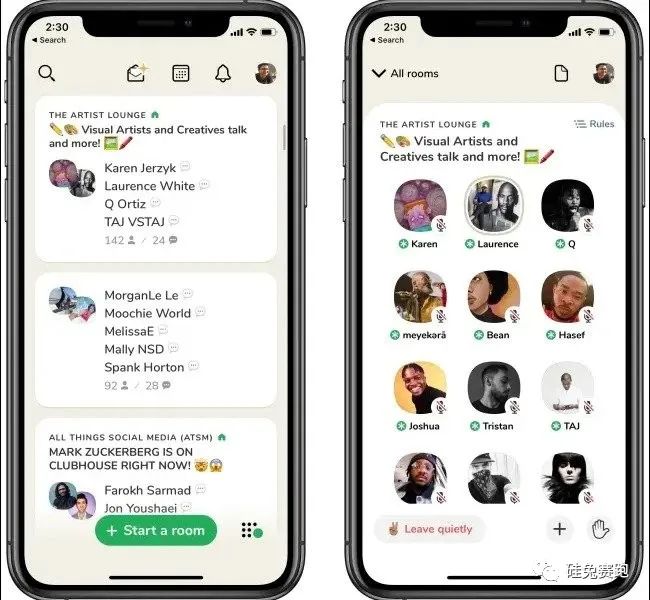
Clubhouse
This popularity also attracted many celebrity figures to give it a try. In early 2021, Elon Musk announced on Twitter and then joined a chatroom on Clubhouse on time. Within a few minutes of the chat starting, the chatroom with a capacity of 5,000 people was filled.
Soon after, Mark Zuckerberg also joined Clubhouse to discuss his plans for Facebook’s future. This conversation between the two completely ignited the popularity of this chat application.
Within half a month, the number of downloads of Clubhouse quickly rose from 3.5 million to 8.1 million. The invitation code on eBay even sold for $400. During this period, Clubhouse also completed a $100 million Series B financing from Andreessen Horowitz.
One year after Clubhouse was officially launched, the number of weekly active users surpassed 10 million, but the total number of users gradually began to decline.
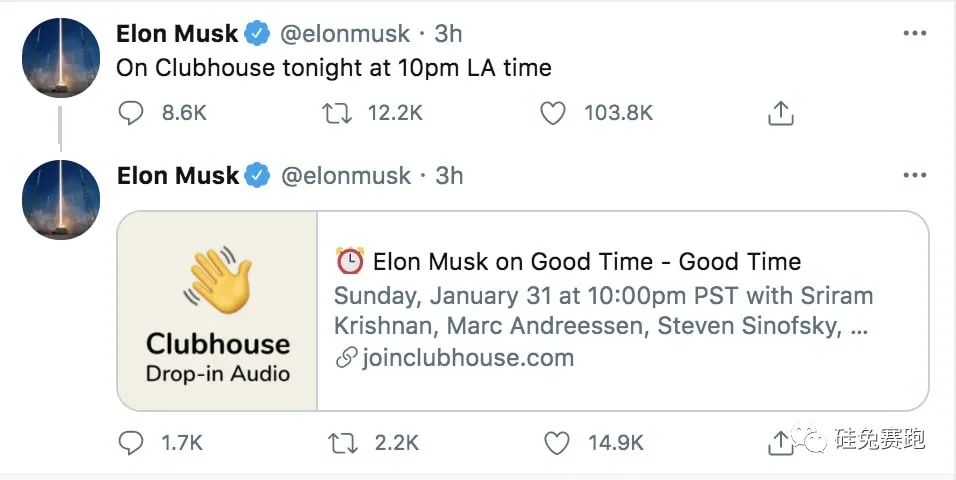
Musk's Twitter announcement
In April 2021, Clubhouse completed a Series C financing led by Andreessen Horowitz. DST Global, Tiger Global, and other institutions also participated, although the financing amount was not disclosed, the valuation after this round reached $4 billion, tripled from the valuation three months ago in the previous financing round.
In order to attract more users, Clubhouse launched an Android version of the app in May 2021, and within 6 weeks of its launch, 10 million new users joined. In July, Clubhouse removed the invitation restriction and opened the app to the public.
However, since its launch, Clubhouse’s high-profile operations have not only brought explosive growth in users and crazy investments from investors, but also aroused the thoughts of competitors who want a piece of the voice social cake:

Emoji Packs: Clubhouse Competitors
Twitter launched the SLianGuaices beta test at the end of 2020 and opened this feature to any user with over 600 followers in May 2021. Twitter even temporarily pinned SLianGuaices to the homepage;
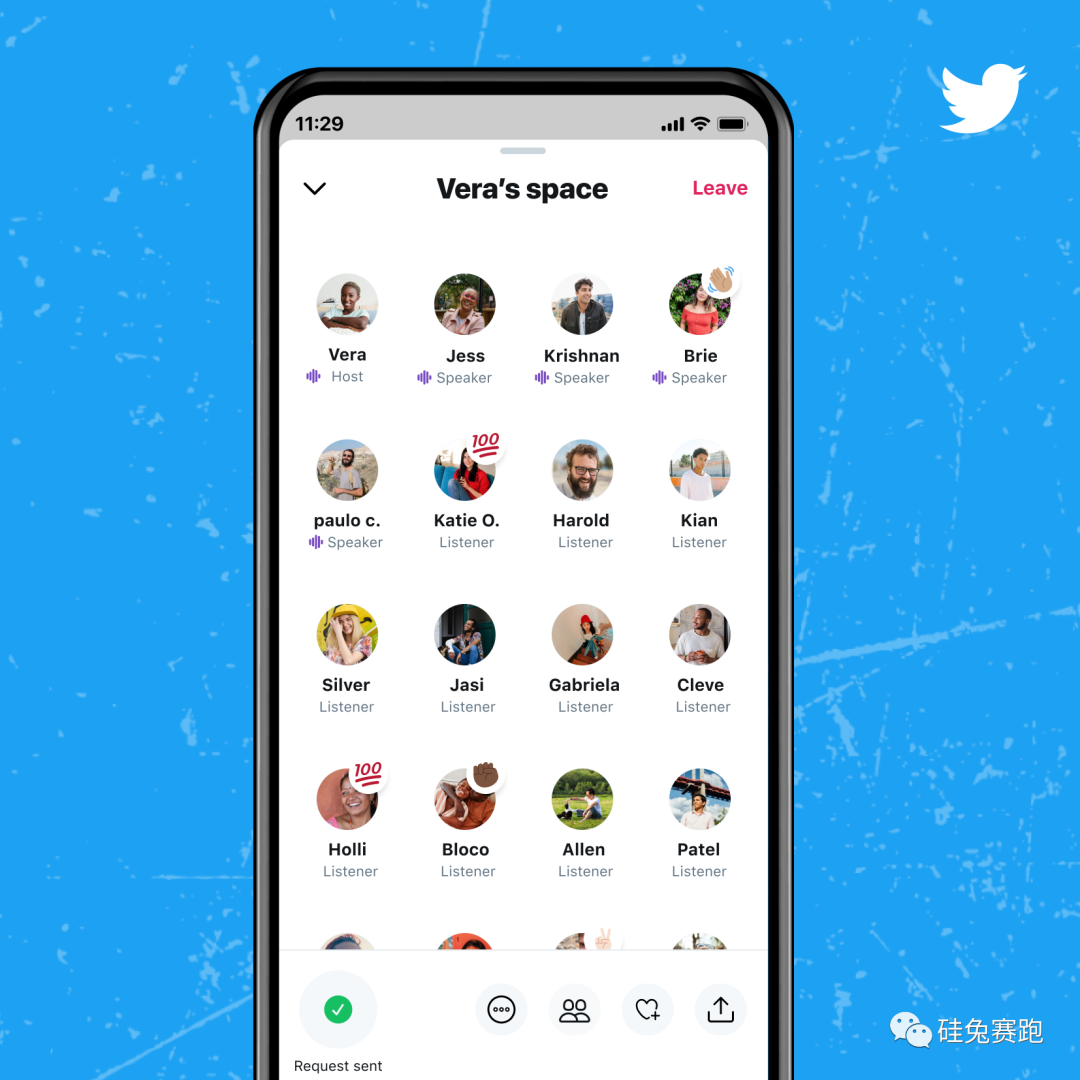
Twitter's SLianGuaices
Discord, which has voice chat as its core feature, launched Discord Stage Channels in 2021, allowing users to organize more private and professional small-scale voice speech and interview events;
Discord's Stage Channels
Facebook launched Facebook Live Audio Rooms in June 2021, where public figures and content creators can initiate voice chats that anyone can listen to. Some netizens even joked that Mark Zuckerberg’s appearance in Clubhouse chat rooms was to “learn from others”.
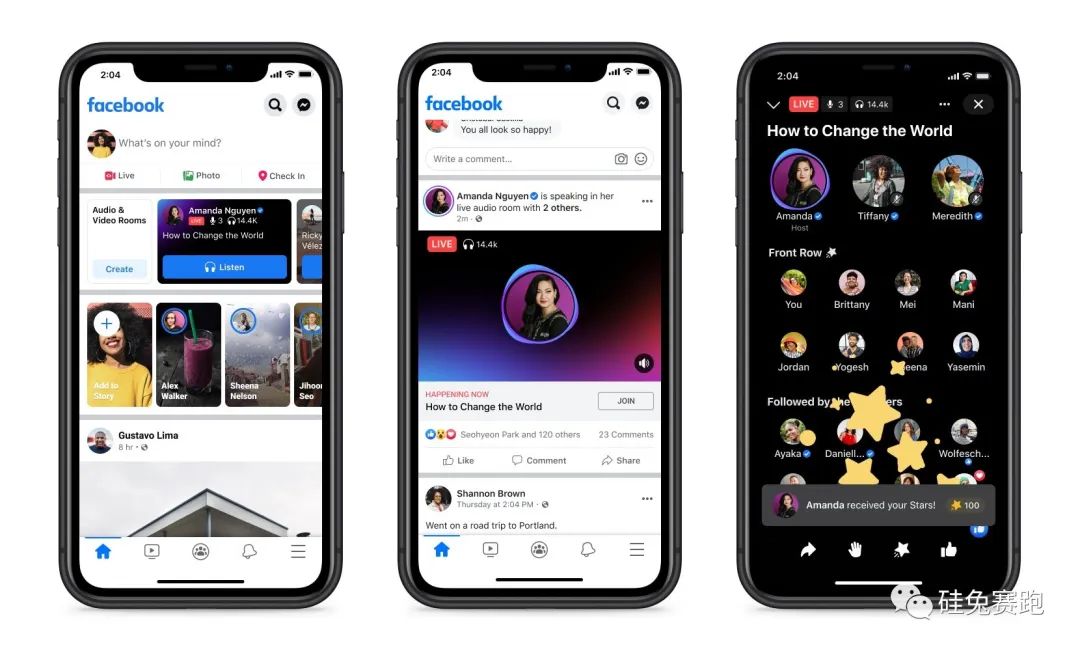
Facebook's Live Audio Rooms
In the same month, Spotify also launched its own Clubhouse competitor – Greenroom, which was developed based on the previously acquired sports audio content app Locker Room. Users from around the world can create and participate in voice chat rooms, and conversations can be turned into podcasts.
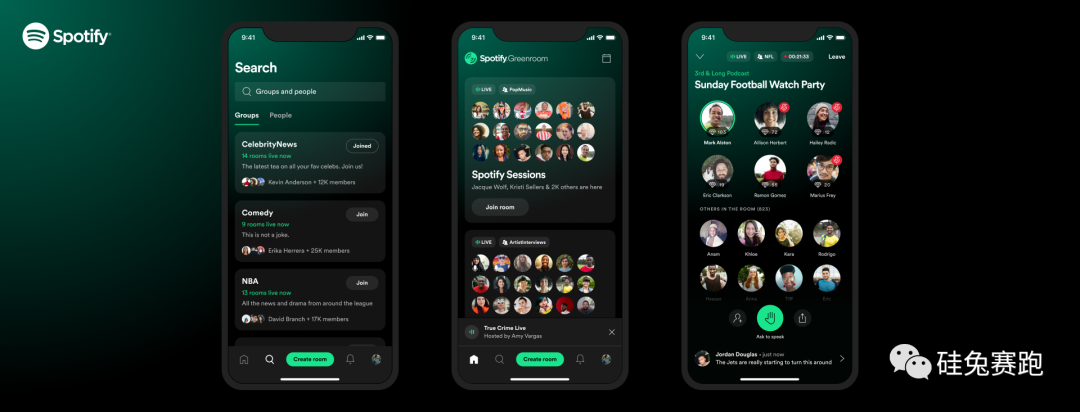
Spotify's Greenroom
Faced with the strong competition from various Clubhouse clones, Clubhouse itself has also begun to show cracks in its walls. For example, the influx of users often causes the app to crash, and there is often false information and extreme speech in voice chats on the platform. Clubhouse is unable to do anything about it, and these have become weaknesses for Clubhouse. By the second half of 2021, its growth has significantly slowed down. According to data from App Annie, in June, its number of downloads reached a peak of 9 million, but by November, this number had dropped to just 920,000.
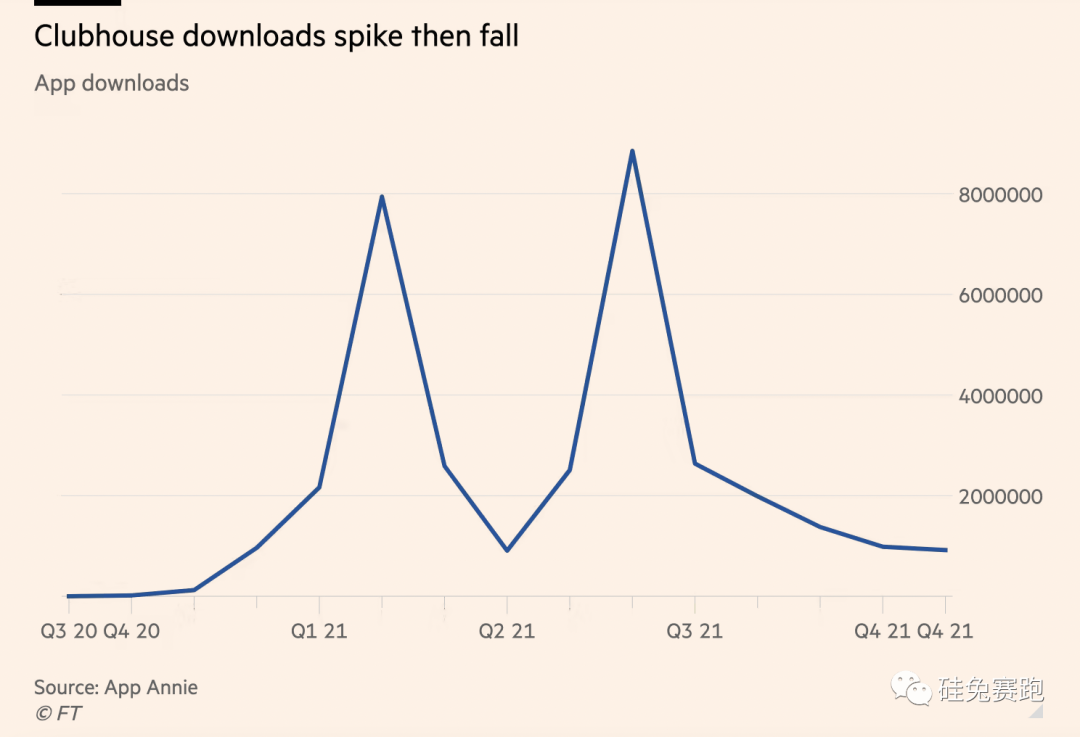
Clubhouse's Download Volume Significantly Decreased
Fall from Grace & Self-rescue
In order to retain users and maintain the title of “the hottest social media platform,” Clubhouse has also made some explorations.
For example, it partnered with TED to broadcast exclusive speech content in voice chat rooms, collaborated with Stripe to allow content creators on Clubhouse to make money, and launched a feature called “Wave” in September 2021, which allows users to quickly invite friends to join voice chats by clicking the “👋” emoji, encouraging more casual and natural social behavior👇

Clubhouse's Wave feature
Less than a month later, Clubhouse launched a feature called “Replays and Clips”, which allows users to replay, capture, and record noteworthy voice segments and share them on other social media platforms, in order to attract more users to join👇
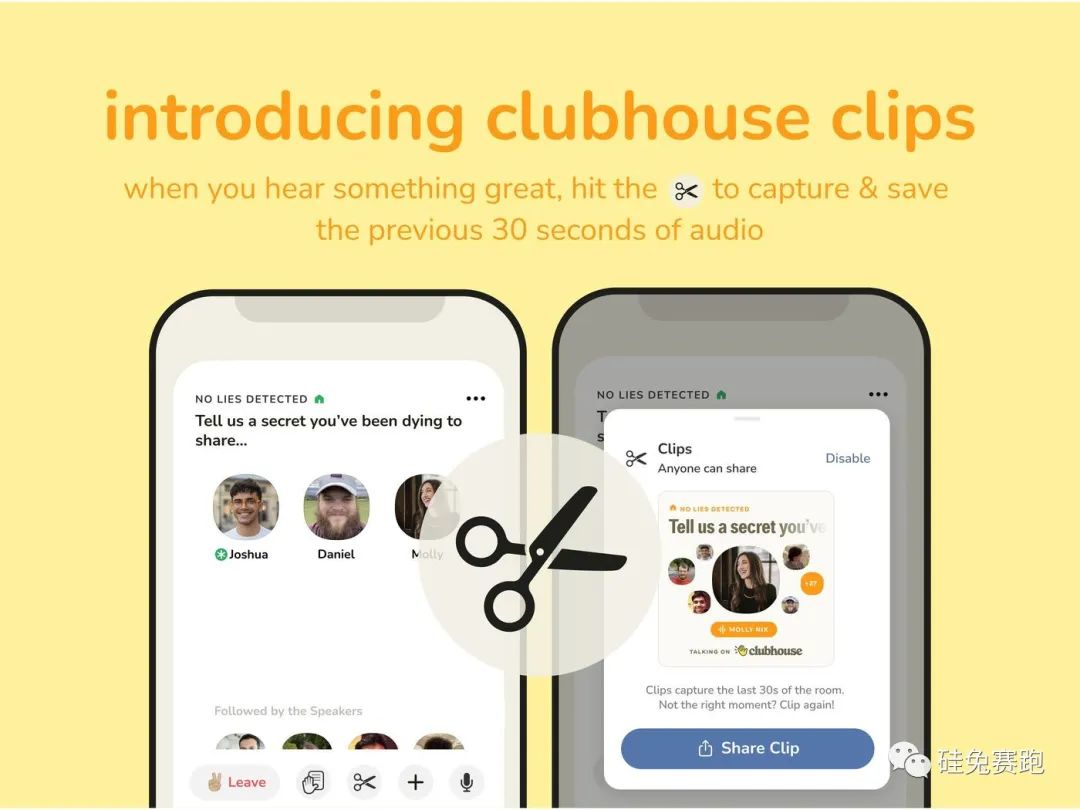
Clubhouse's Replays and clips feature
Last year, Clubhouse also added a text chat feature to the app, stating that “we hope everyone can join the conversation in their most comfortable way”, and also tested game features on the app to help users break the ice and start conversations👇
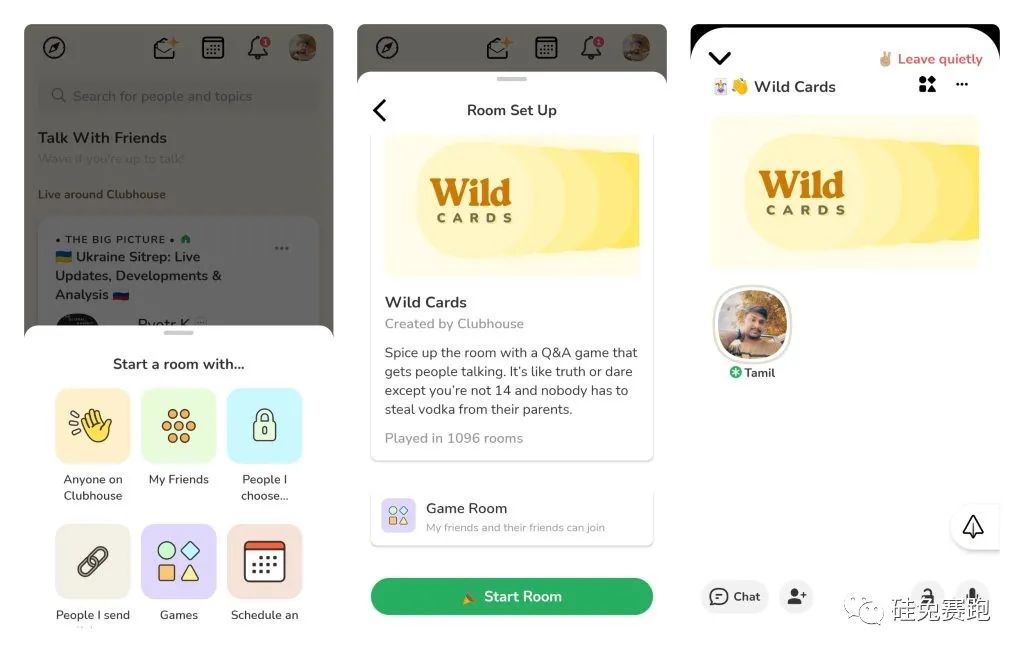
Clubhouse's wild cards feature
Unfortunately, these layout changes have had little impact, and Clubhouse has started to be abandoned by large users. The number of active users in the beginning of this year was only 3.5 million, a decrease of about 60% compared to the peak period in 2021. In addition, Clubhouse carried out two rounds of layoffs last year and this year respectively, with the latest round in April resulting in more than half of the staff being laid off.
After being out of the public eye for a while, Clubhouse seems to have gone through some self-reflection. In September, Clubhouse announced in a blog post that “we are back, this time with a new Clubhouse”. The new version mainly focuses on a new chat function called “Chats”. In the blog post, Clubhouse introduces this function as a combination of group chat and Instagram Stories. Users can send voice messages at any time, and other users can listen and reply at any time. Users can chat with friends in their contact list or friends of friends, thus increasing the possibility of expanding their social circle.

Clubhouse's Chats feature
This “Chats” feature will coexist with the previous voice chat room feature, but Clubhouse hopes that this new change will achieve different effects from the previous voice chat function.
Clubhouse retains the core of voice on the media, because voice is more relaxed and efficient than text and images, and users can better perceive their friends’ true emotions and status through voice. Asynchronous chat reduces social pressure and makes it easier for users to pay attention to their friends’ updates and join discussions. Chatting will also become more profound and interesting. It is not difficult to see that Clubhouse is encouraging users to transition from following lectures by celebrities and industry leaders to daily conversations with friends.
In the face of transformation and layoffs, founder LianGuaiul Davidson did not attribute it to the recent market fluctuations, but rather saw it as a decision made to adapt to people’s social needs in the post-pandemic era. With people returning to physical socialization and life, it has become increasingly difficult to find interesting discussions on Clubhouse or to spend time participating in them. The adjustments made by Clubhouse this time aim to address these pain points, retaining the ease and flexibility of voice to allow users to participate at any time, while unlocking more usage scenarios with daily social needs. It is an exchange of a better product for a bigger future. As for the layoffs, it was because the previous team size was too difficult to change, and in order to ensure a lightweight transformation, this decision had to be made.
Founder: Explosive Growth Does More Harm Than Good
For startups, achieving explosive growth by becoming “internet famous” is a dream come true. This means they can save on high customer acquisition costs and rely on word-of-mouth to quickly capture the attention of users and investors. This is exactly what happened with Clubhouse. Within a few months of its launch, it achieved 10x monthly growth and quickly became the number one app on the App Store in countries like Japan, Germany, and Italy. It also completed three rounds of financing within a year.
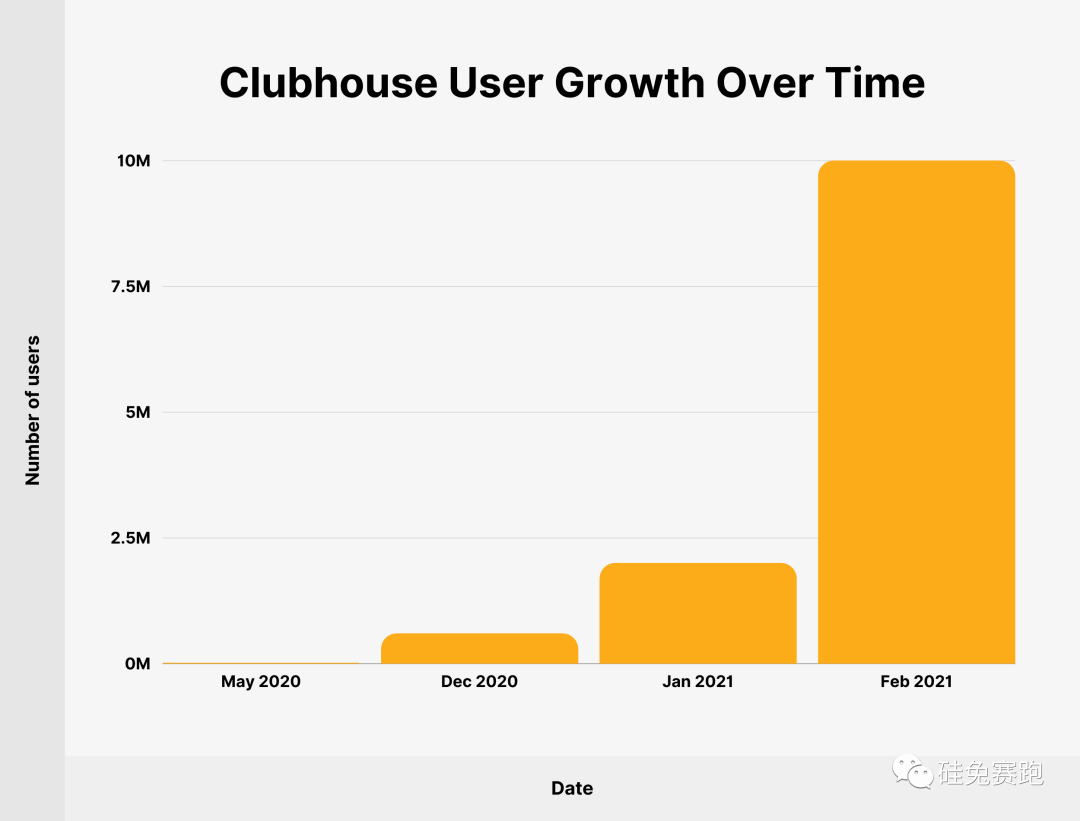
Clubhouse's user growth
However, this level of attention also brought a lot of pressure to various aspects of Clubhouse’s development. For example, as a large number of users flooded in, the app experienced frequent crashes, resulting in a poor initial experience for most people and leading them to abandon it. Another issue was that Clubhouse lacked a robust content moderation system, making it vulnerable to abuse by extremist organizations trying to manipulate the conversations. And most importantly, Clubhouse faced fierce competition from other software that quickly imitated its features, causing it to lose its unique competitive advantage.
Nevertheless, experiencing such ups and downs during the early stage of company growth is excellent training for founders’ mindset. LianGuaiul Davidson mentioned in a previous interview with TechCrunch that he has been trained to be “both calm and brave”. When everything goes smoothly, he understands that such momentum won’t last forever. But when faced with setbacks, he also has the confidence to overcome difficulties. However, Davidson also emphasized that he believes becoming an internet sensation is not a stroke of luck for a startup. This rocket-like growth does more harm than good to a company, and what a company needs most is steady development.
Clubhouse’s recent decision to transform also reflects a change in Davidson’s philosophy. It maintains the core of intimate and flexible voice socializing and expands the surprise of discovering interesting conversations to developing new chat friends. Instead of pursuing traffic brought by influencers, Clubhouse is now focused on building products based on the daily social scenarios and habits of ordinary people. As the conversations shift from “public” to “private,” Clubhouse may be trying to peel off the glamorous facade and rediscover its original intention of connecting people through its products.
For Clubhouse, the good news is that the copycat products that once posed a significant threat to it have lost their momentum. For example, Spotify closed its audio live streaming app, Spotify Live (formerly known as Greenroom), in April this year, stating that it no longer made sense as a standalone application for Spotify. Twitter Spaces, after an argument between Elon Musk and a journalist in one of the Spaces last year, was announced to be closed by Musk. Facebook announced the discontinuation of Facebook Live Audio Rooms at the end of last year, and users could no longer start broadcasts from the previous audio rooms. Although Discord’s Stage Channel feature still exists, Discord has closed its discovery feature, stating that it did not help users find the channels they wanted to listen to. This means that Clubhouse now faces less competition.
But thinking about it carefully, this good news is actually a false proposition, because if even the social media giants cannot solve the challenges of voice social networking, then the challenges for Clubhouse are even greater. Perhaps we can explain that voice is not the main battlefield for these software platforms, so they haven’t put in much effort. However, voice social networking has not made much progress in Europe and America in recent years, especially when we compare it to Twitter, which has become a new platform for people to record their moods and attitudes with text, Instagram, which has opened up new ideas for content creators to share beautiful pictures, and TikTok, which has sparked a craze for short videos. However, the exploration of voice is mostly limited to podcasts. Voice, which seems to be the most natural medium, cannot open the hearts of this generation of “no social, no life” users.
Clubhouse’s attack this time indeed has a sense of “burning the boats”, but this time it not only needs to save its own fate, but also bears the expectations of many people for voice social networking. Can LianGuaiul Davidson’s optimism and laid-back attitude win this battle? Let’s wait and see.
Like what you're reading? Subscribe to our top stories.
We will continue to update Gambling Chain; if you have any questions or suggestions, please contact us!